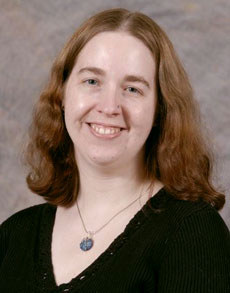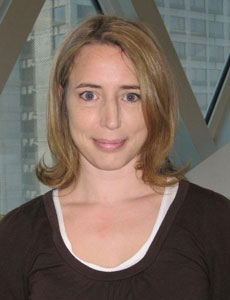 |
|||
| iSchool Home Page | News | Events | Make a Gift | |||
|
Summer 2008 | Return to issue home
Alumnae Prepare to Lead Their Field (Part 2 of 2) By Ann Beckmann All four Information School alumnae in this year's American Library Association’s (ALA) Emerging Leaders program say its networking opportunities was a key driver of their interest to participate. The University of Washington’s four iSchool graduates are among 124 librarians nationwide who were chosen for the 2008 Emerging Leaders program, now in its second year. The ALA created the program “to enable young librarians to get on the fast track to ALA and professional leadership.” Those who participate must have graduated within the last five years or be under the age of 35. About a third of this year’s Emerging Leaders received sponsorships, including two of the iSchool graduates. Emerging Leaders attended a daylong session during the January ALA midwinter meeting in Philadelphia where they networked with peers, explored the ALA structure, discovered opportunities to shape and lead the organization, and joined in problem-solving workgroups. Each Emerging Leader collaborated on a group project that was presented at the annual ALA conference in Anaheim, Calif., in late June. In our spring issue we spoke with Emily Inlow-Hood and Reese (Coffin) Evenson. Now we hear from two more iSchool MLIS graduates who are 2008 Emerging Leaders.  Linda Shippert Linda ShippertLinda Shippert (’00) Some people say “break a leg” for luck, as a figure of speech. For Linda Shippert, literally breaking a leg—not once, but twice—helped to shape her career goals. In the fourth grade she broke her leg and had to spend time in the school library rather than attend physical education class. The school librarian, Shippert says, planted a seed that never stopped growing. Later, as a freshman at the University of Washington working at Suzzallo Library, Shippert broke the same leg again. This time, the break was much worse and prevented her from shelving books. She moved into collection maintenance and quickly realized she was better suited to her new work. Not long after that, she began to understand the advantages of a career as a librarian. Allyson Carlyle, cataloging professor at the iSchool, recalls Shippert’s intellectual curiosity, keen analytical ability, writing skills and leadership qualities, particularly as a serials cataloger. “If she is fortunate enough to be hired by a library that would support her travel to North American Serials Interest Group (NASIG) and ALA meetings, I would expect her to have an impact nationally,” Carlyle wrote in a reference letter for Shippert when she applied for and received a student grant from NASIG. After she completed her MLIS, Shippert became a solo librarian and operated a small research center for the King County Department of Natural Resources and Parks. She relocated to Pullman, however, and soon discovered that working for a local public library wasn’t what she envisioned for herself. Instead, she accepted a temporary assignment with Washington State University as the science and maps librarian. At the time of the interview, SHippert was in her second temporary assignment at WSU, this time as interim head of the Health Sciences Library. Shippert says involvement in the ALA interested her once she completed her MLIS. “When I was working on my degree, it was easy to feel connected to the profession. I lost that when I was no longer a student,” she says. Becoming part of the Emerging Leaders program was another step she wanted to take. She was pleased when she learned she was one of 38 of this year’s Emerging Leaders to receive a sponsorship. Her sponsor is the New Members’ Roundtable, which gave her $1,000 to cover some of her expenses for the conferences in Philadelphia and Anaheim. When she arrived in Philadelphia, however, she wasn’t sure what to expect. “I guess I went into it feeling a little cynical about what I was going to learn. Would I learn more about being an effective leader? But at our all-day session in Philadelphia, I was inspired by the ideas of the ALA leadership. They were very encouraging,” Shippert says. What impressed her most? “The leaders of the ALA said if we aren’t getting what we want from the organization, we should just change it. That was very exciting to me,” she says. As the Emerging Leaders began the selection process for their group projects, some of the more popular ones filled with participants in short order, according to Shippert. There were a few projects that lacked enough participants to move forward, so she joined one of those. Shippert’s small workgroup worked to designed and conducted a survey of interlibrary loan staffing issues. “We’re a small group, but one of my colleagues, in particular, is so full of optimism, it’s a pleasure to be part of this project,” she says, adding, “this Emerging Leaders experience is just the boost I needed right now.”  Valerie Wonder Valerie WonderImmigration and Refugee Programs Manager Seattle Public Library Valerie Wonder’s path to leadership in community programming for refugees and immigrants took her on remarkable journeys to libraries in rural America and Africa. After she completed bachelor’s degrees in art history and women’s studies at the University of Washington, she went to work for the Bill & Melinda Gates Foundation as part of a team that implemented a nationwide grant program to increase public access to information by providing computers, Internet connections and training to rural public libraries. Heading that program was Mike Crandall, who now chairs the iSchool MSIM program. In the summer after her first year with the Gates Foundation, Wonder did volunteer work for the now-defunct nonprofit called World Library Partnership in South Africa. While there, she worked in school libraries in the KwaZulu-Natal province. As an iSchool student, Wonder’s focus became social and cultural aspects of information systems. She says she had her first experience working with refugees during an especially valuable volunteer internship while in iSchool. “I worked with Harborview Medical Center on a National Library of Medicine grant to expand access to health information in refugee communities. The contacts I made during that internship are people I still collaborate with today,” she says. By the time she completed her MLIS degree, she knew she wanted to pursue another master’s degree, this time in public administration at the Evans School of Public Affairs. She had most of her MPA coursework complete when she entered the Peace Corps and went to the Republic of Benin in West Africa. For her first Peace Corps project, she helped the Ministry of Commerce on information technology projects that included networking computer workstations. “There was no sharing of Internet connections, files or anything else,” she says. For her second project, Wonder provided training to rural public and school librarians on basics such as library programming, cataloging, resource and fundraising, book mending, community involvement and developing library boards. When she returned from the Peace Corps, she went right to work as community programs manager for the International Rescue Committee where she planned and implemented classes for refugee seniors, adults and youth. She finished her MPA in 2006, the same year she joined the staff at the Seattle Public Library. Today, she coordinates system-wide community programming for children, teenage and adult refugees and immigrants. Her programming and outreach includes everything from non-English story times to classes in life skills on legal, financial, educational and workforce issues. “My work is designed to connect immigrants with information they can use to navigate our systems, as well as enrichment opportunities that honor and celebrate their own cultures,” Wonder says. She joined the American Library Association’s Ethnic and Multi-cultural Information Exchange Round Table last year and is now involved in organizing that round table’s programs for the 2009 ALA annual conference. “I’ve been looking to make contact with others in similar jobs. There aren’t many, but there are a few,” Wonder says. As a 2008 Emerging Leader, her group project was to identify best practices for library internships and practica. She is researching what’s available in the Pacific Northwest. She says the Emerging Leaders program appealed to her on several levels. “I’m especially interested in networking, learning from other people and establishing a community nationwide of librarians focused on serving immigrants and refugees,” Wonder says.
Summer 2008 | Return to issue home
| |||
|
|||
